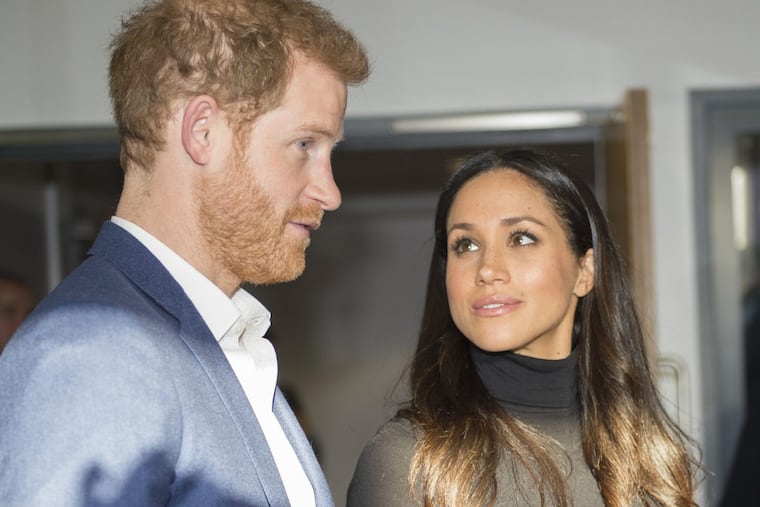In an increasingly mixed-race America, who decides what we call ourselves?
We talk to Camille Z. Charles about defining and describing mixed-race identity as the country increasingly becomes more racially diverse.

Last week, the Meghan Markle controversy was her anticipated visit with Prince Harry to Queen Elizabeth's estate at Sandringham for Christmas, an unprecedented invitation for an unmarried couple.
Before that, the debate was about Markle's mixed-race identity: Do her African American mother and white father make her white, black, or biracial? After her engagement to Harry, some women celebrated the notion of a "black princess" — although she'll actually be a duchess — while others argued she should be described as biracial, not black.
How to define, describe, and label mixed-race identity has been a brewing controversy in recent decades as the country becames more racially diverse. Since the 2000 census, when Americans were first able to choose more than one race, the Census Bureau reported that people of color will be the majority in the nation by the 2040s and that more than half of American children will be part of a minority race or ethnic group by 2020. In fact, as of last year, the census said minority or ethnic-group children under the age of 1 are already in the majority.
The sociologist Herbert Gans blamed Census Bureau data for the increase in white nationalism and alt-right fear "that they are being threatened and overwhelmed by a growing tide of darker-skinned people." He predicted that mixed-race Latinos and Asians will eventually identify themselves as white.
Camille Z. Charles, the director of the Center for Africana Studies at the University of Pennsylvania, is the daughter of an African American mother and a white father. Charles identifies as black. She is working on a book exploring the intra-racial diversity among black Americans who identify either as African American, mixed-race/biracial, or black immigrant, tentatively titled The New Black: Race-Conscious or Post-Racial?
Why do you think it was so important for both black people and white people to "claim" or emphasize that part of Meghan Markle's identity? The same thing happened when President Barack Obama, son of a white mother and black Kenyan father, was elected.
Black people have always accepted mixed-race people as part of their community. With Obama, I think white people needed to be OK with voting for him. They needed to feel that he would look out for them. One way to do that was to emphasize the white part of his identity … With Meghan Markle, people want to correct the cognitive dissonance where [in their minds] black women aren't princesses or duchesses. If she's half-white, then that's closer to the reality that makes sense. There's a lot of people who are uncomfortable with the idea of a black person in such a position. It's a way to set the world back right for them [by focusing on her white heritage].
Philadelphia-born novelist Mat Johnson, author of "Loving Day," said that growing up, he identified as black but looked white. He called this the "optical illusion" of being biracial. In his youth, he never heard the word "biracial." "And when I did hear that, I reacted to it defensively. I thought it was just black people of mixed heritage who were just trying to run away from blackness," Johnson told NPR in 2015. Do you think people who call themselves biracial are running away from blackness?
The biracial movement was largely about white mothers [of mixed-race children] who were concerned that if we used the system that Americans had traditionally used, as they filled out census forms and school records, that they were being erased. It's interesting that white women were behind that movement to question the "one-drop" rule [a social and legal principle that one drop of black blood made you black]. If the mothers had been black, it might not have come up; their children's identity was black. It was a concern of: "Don't erase me from my child's identity."
You have an African American mother and a white father, yet you describe yourself as black, not mixed-race. Why?
Most white people think I'm black. Most black people think I'm black. It's on my birth certificate. My maiden name is Zubrinsky and when I was younger, that was the only reason some people knew I was mixed … My husband, who is also biracial, identifies as black. So do our daughters, who are 17 and 13. But my 13-year-old is more racially ambiguous in appearance. But my daughters don't get caught up with any of this [focus on racial identity]. They're growing up in a world where all kinds of people are dating and marrying each other. They have other friends who are mixed the way they are.
Your research currently involved college students who are either biracial, African American or immigrant blacks. Are young mixed-race black people today more likely to identify as mixed race?
Some respondents who were classified as black by the registrar chose to self-identify as mixed or biracial, or as "black, but …" I see it all.
Do you think the increase in mixed race people could lead to a post-racial society?
Post-racial is a made-up thing. Black people never thought [racism] was over. … There are all kinds of research that there is a fear about the shrinking number of whites and what will happen [as the country becomes browner]. That fear feeds into anti-black and anti-brown ideas and it's always been that way.
There are people who criticize the media or activists for discussing racial identity so much. Are they right?
Society started us down this road a long time ago. The deepest inequalities in our country are racial, so we aren't in a position to just stop, at least if we care about equality and justice.